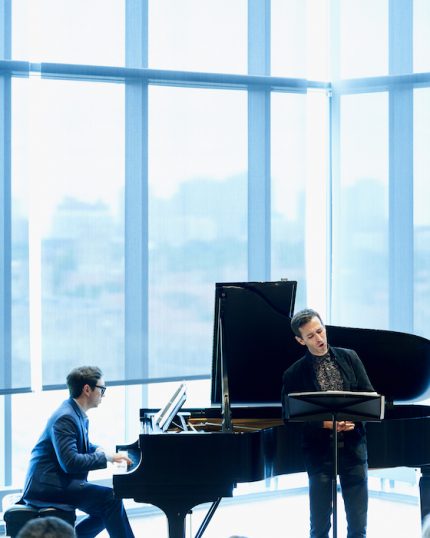Collaborative Works Fest embraces art songs of the world in final program

This year’s Collaborative Works Festival by the Collaborative Arts Institute of Chicago began on Thursday with art songs by Chicago-based women composers, and broadened out to the rest of the country on Saturday.
On Sunday afternoon at the University of Chicago’s Logan Center CAIC went international for its concluding concert, titled “The World.”
“Come unto these yellow sands” from Jonathan Dove’s cycle Ariel provided the perfect opening. Lauren Snouffer sang this song for unaccompanied soprano, which begins with the singer making shushing sounds evoking the sea. Her style suited the music perfectly—bright high notes, “r”s rolled for archaic effect. A couplet beginning “Foot it featly here and there” features rapid Mendelssohn-like skipping figures, which Snouffer delivered with crisp diction.
Snouffer was also the soloist for the chamber version of Kaija Saariaho’s Mirage. Unfortunately, the celebrated Finnish composer is not at her most imaginative in this music. The cello’s sliding and the plucking and stroking of the piano strings sound too clichéd and are used too often. The opening line—“I am a woman who flies”— leaps as expected to a discordant high note on the word “flies.” If you guessed the soprano would waver on the word “swims” in “I am the lady who swims,” then points for you.
One cannot fault the performance, though, by Snouffer, pianist John Arida, and cellist Kenneth Olsen. Snouffer navigated her leaps fearlessly and shifted between characters dramatically, including some genuinely creepy hoarse whispers. Arida’s clean finger-work made sure the busy textures never congealed, and Olsen brought intensity to the more agitated passages.
Tenor and CAIC artistic director Nicholas Phan was the soloist for Nicolas Bacri’s Drei romantische Liebesgesänge, which was heard in its U.S. premiere. The title and the choice of texts—poems by Rückert, Goethe, and Chamisso—immediately evoke German lieder. The arcs of Bacri’s melodies channel elements of that Romantic tradition. For example, the churning bass ostinato in Bacri’s surprisingly dark depiction of the west wind in “Suleika” conjures Schubert’s taste for the same sort of figures.
Phan, as always, displayed his expert control of dynamics, used to color any syllable he pleases. An effective example was his huge swell in and out of a high note on the word “traf” (“hard”) in the third song, “Nun hast du mir,” where the text describes a sharp sting of pain. The skill of Phan’s dynamic shading was matched by Arida’s pedaling, which was beautifully tailored to Bacri’s harmonies.
Phan was soloist again for Jonathan Dove’s Out of Winter—a loosely Britten-inspired song cycle setting archly rhymed poems by the tenor Robert Tear. Eighth Blackbird co-founder and pianist Lisa Kaplan accompanied him, supplying plentiful energy, especially in the bustling fourth and sixth movements. The blazing fortissimos of the latter let Phan show yet another talent: singing at full blast without letting his tone turn harsh.
Countertenor Anthony Roth Costanzo was the soloist for two works: Ian Venables’s At the Court of the Poisoned Rose and Errollyn Wallen’s Daedalus. To both he brought a vibrant, crystalline tone.
Venables’s song alternates between slow, sad vignettes of Mary, Queen of Scots’s life at court and sprightly mock-Tudor sections describing the little things she treasured. There was only one flaw in Costanzo and Arida’s otherwise characterful rendition: Venables’s program notes suggest that the line “Queens should be cold and wise” is “the emotional climax of the work,” but their performance, oddly, did not highlight this moment at all.
Costanzo and Kaplan closed the concert with Wallen’s Daedalus. The rippling chords of the lengthy introduction, woven into a hypnotic spell by Kaplan, gave way to a hybrid between art song and contemporary pop, leaning towards the latter.
Costanzo’s singing made for an interesting match precisely because there was no hint of pop style in his delivery. He didn’t croon or scoop the many melismatic “ooh”s, instead floating them delicately in the air.
Posted in Performances




